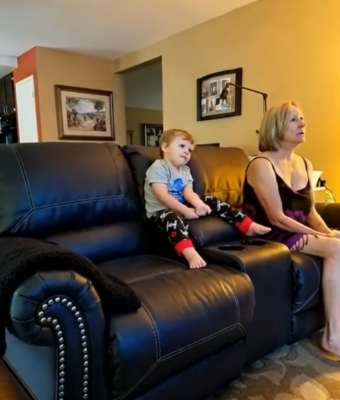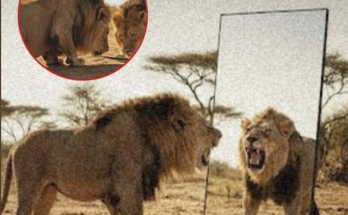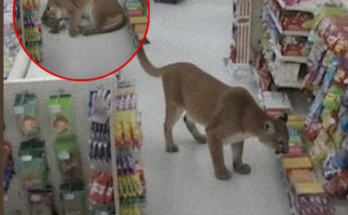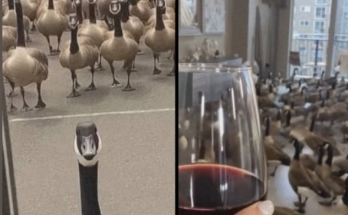I came back from brushing my teeth and found them exactly like this—my mom in her slip, my son Luca curled beside her, both locked on the screen like it was telling secrets.
I didn’t think much of it until Luca leaned forward and said, in this flat little voice:
“That’s where you lied, Nana.”
My mom flinched. Not a twitch—a full-body shiver.
I stepped into the room. “What did he say?”
She didn’t answer. Just hit pause. It was a black-and-white documentary—something about old train stations in the Midwest.
Luca pointed again. “There. That’s the place. You told Grandpa you went to a wedding, but really it was there.”
The screen showed a crumbling terminal. Joliet, Illinois.
I looked at my mom. She was shaking her head, lips pressed tight.
“We’ve never been to Joliet,” I said.
She stood up and walked to the hallway without a word.
Ten minutes later, she still hadn’t come out. I checked on her. The bathroom door was locked. I knocked lightly.
“Mom? You okay?”
“I’m fine,” she said through the door. Her voice was strained. “Just need a minute.”
Luca had returned to his LEGOs, humming to himself like nothing happened. But my brain wouldn’t let it go.
That train station… That place… Why did he say that? How would he even know about Joliet? He’s six.
And what was that look on my mom’s face?
That night, after Luca went to sleep, I tried again. Mom was in the kitchen, wiping down the counter like she was waiting for something to do.
“You want to talk about earlier?”
She glanced at me. “There’s nothing to talk about.”
“Luca said something strange. He mentioned a lie… about Joliet. And you looked—Mom, you looked like you saw a ghost.”
Her hand paused. The rag hung limply between her fingers.
“I don’t want to get into it,” she said quietly.
“Was there really a lie?” I asked. “Did you go to Joliet?”
She turned and looked at me, and for the first time in years, I saw a woman who looked unsure of who she was.
“I went there once,” she said. “A long time ago. Before you were born.”
I sat down. “Why did Luca say that? He wasn’t even alive back then.”
She sighed. “I’ve asked myself that every day since he was born.”
I blinked. “What does that mean?”
She sat across from me and placed the rag on the table like it was something sacred. Then, in a trembling voice, she said, “When you were pregnant with Luca, I had dreams. Weird ones. They started after your first ultrasound. Dreams of a little boy—standing in that same station. Always waiting.”
My throat tightened. “Waiting for what?”
She looked down. “Someone who never came.”
The room fell silent except for the hum of the refrigerator.
She didn’t speak again that night. I went to bed with questions crawling in my chest like ants.
The next day, I did what any daughter with a mild panic disorder and a curious mind would do. I Googled the Joliet train station. It was decommissioned in the late ’80s. Since then, it had been mostly abandoned. Some photography students went there to take moody pictures. A local newspaper had tried to push for restoration funding. Nothing crazy.
Except one article.
Titled: “The Runaway Bride Who Vanished at Joliet Station – 1979.”
It was more of a local legend than a police report. Apparently, a woman named Elise Warner told her fiancé she was going to the store the day before their wedding. She never came back. But a janitor at the Joliet station claimed to have seen a woman in a wedding dress boarding a freight train the next morning. No luggage. Just flowers in her hand and tears on her face.
She was never found.
I read the article three times. I didn’t know what I was looking for. But the date—1979—stood out. That was two years before I was born.
And my mom’s maiden name was Warner.
That night, I asked her directly.
“Were you Elise Warner?”
She didn’t flinch. Just closed her eyes like she’d been expecting the question.
“I was Elise, yes. But I didn’t vanish. I came home the next day.”
“To Grandpa?”
“To your father, yes.”
“But you left,” I said, “You went to Joliet. In a wedding dress.”
She nodded. “I panicked. Cold feet, I guess. The pressure… it was so much. Your dad and I… we weren’t in love, not really. We were expected to marry. I didn’t want to be a disappointment.”
My heart beat faster. “But you got on a train?”
“I didn’t get far,” she said. “I sat on that platform for hours, crying. Then I turned around, bought a bus ticket, and went home. Your dad never found out. He thought I’d stayed at my sister’s place that night.”
I tried to process it. “So Luca was right. You lied.”
She looked up at me, eyes glassy. “And somehow, he knew.”
The next few days passed in a fog. I couldn’t stop thinking about it. My son, barely old enough to read, had seen through a fifty-year-old secret.
And not just any secret. A life-changing one.
That weekend, we went to the park. Luca was eating a snow cone, blue syrup dripping down his chin.
Out of nowhere, he said, “Nana was sad that day.”
I turned to him. “What day?”
“At the station,” he said. “She sat by the clock. She held her knees and didn’t breathe right.”
I nearly dropped my phone.
“How do you know that?” I asked gently.
He shrugged. “I just remember.”
“You remember… being there?”
He nodded. “I was with her. I sat next to her. But she couldn’t see me.”
Chills ran down my spine.
That night, I called a friend—Kira—who was deep into spiritual stuff. Crystals, regression therapy, all that. I’d always teased her, but now I wasn’t so sure I should’ve.
When I told her what happened, she got quiet.
“There’s something called a soul echo,” she said. “It’s when someone close to you remembers something from a time they weren’t physically alive. Like a memory passed down, but through emotion.”
“That’s not science,” I said.
“It’s not,” she agreed. “But neither is a six-year-old knowing what Joliet looks like in the ‘70s.”
She wasn’t wrong.
I didn’t tell Mom what Luca said at the park. I didn’t want to push her.
But a few weeks later, something strange happened. A letter came in the mail. Handwritten. No return address.
Inside was a faded photo. A young woman—barely twenty—standing on the Joliet platform in a wedding dress, mascara running, eyes swollen. It was unmistakably my mom.
There was a single line on the back of the photo:
“I never forgot you. I came back too. – T.”
I stared at it for hours. “T”? Who was T?
I showed the photo to my mom.
She gasped like she’d been slapped.
“Tony,” she whispered. “His name was Tony.”
She sat down slowly.
“He was the man I was supposed to meet there,” she said. “We planned to run away. To California. He had a motorcycle, dreams, everything. We were in love, but he wasn’t… approved of.”
“What happened?”
She laughed softly, but it came out more like a cry. “I waited for him for hours. Thought he chickened out. But maybe—maybe he came late. Maybe I left too soon.”
I looked back at the photo.
“He took this,” I said.
She nodded. “But how did he get our address? How did he know?”
Luca walked into the room. “I told him.”
We both looked at him.
“What do you mean?” I asked.
He picked up the photo. “He asked where you were. So I told him. He was kind. He said Nana used to smile like sunshine.”
My mom broke down crying.
She didn’t stop for a long time.
A month later, she went to Joliet. I went with her. She stood at the platform again, now overtaken by weeds and rust. She didn’t say much. Just looked around and whispered, “I’m sorry.”
That summer, something changed in her. She smiled more. She started painting again. She even joined a local community group for seniors who wanted to travel.
And Luca? He stopped talking about the train station. Like the memory had finally gone back to wherever it came from.
Then, in late August, another letter came.
This one had a return address.
It was from Tony.
He lived in Oregon. Had a wife once, lost her to cancer. No kids. He wrote:
“I thought you never came. I waited until dusk, but maybe I missed you by minutes. I carried that day with me for forty years. Seeing your grandson was… surreal. He said you were safe. That you forgave me. That you still painted daisies.”
Mom cried reading that.
They started writing letters back and forth. Then phone calls.
By Christmas, he flew in to visit.
I expected awkwardness. Regret. But when they saw each other at the airport, it was like time folded.
They hugged like kids. Like people who lost years but found something else instead—peace.
They sat on the porch that night, laughing. Talking about old record stores, banana milkshakes, and songs they thought the other forgot.
Mom looked ten years younger.
And Luca? He walked up to Tony and said, “You made it this time.”
Tony bent down, kissed his forehead, and whispered, “Thanks to you.”
I stood there, watching them, and felt like the world had just fixed something quietly broken.
We always think time only moves forward. That once a moment is gone, it’s lost forever.
But maybe some moments wait. In old train stations. In dreams. In children who remember things they shouldn’t.
The lie my mom told wasn’t about betrayal. It was about fear.
And the truth that came after?
That was about courage.
About love never really leaving—just waiting on the right platform.
So here’s what I learned:
Sometimes the past doesn’t haunt us. It tries to heal us.
And every once in a while, the universe lets us finish a story we thought we abandoned long ago.
If this story made you feel something—share it. Like it. Let someone else know that it’s never too late to come home.



